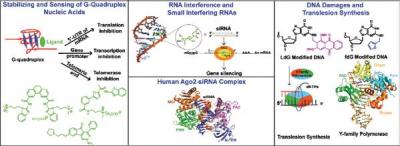
(1) Chemically modified functional nucleic acids (siRNAs, DNA enzymes and aptamers)
Small interfering RNAs (siRNAs) utilising RNA interference (RNAi) to silence disease associated genes are touted as a next generation therapeutic strategy. To harness the full therapeutic potential of siRNAs, introduction of chemical modifications are warranted. We design and screen sugar modified siRNAs, DNA enzymes and aptamers, endowed with drug like properties. Moreover, we utilise a computational model of Human Argonaute 2, the key catalytic engine of RNAi, to rationalise the position dependent tolerance of chemical modifications on gene silencing.
(2) G-qudruplex DNA and RNA stabilising ligands
Selective stabilisation of G-quadruplex (G4) nucleic acids by small molecules is emerged as a novel strategy to develop therapeutic agents against deadly diseases such as cancer. Since quadruplexes can adopt various conformations, achieving specific stabilisation to a particular G4 structure is challenging. We design and synthesise molecule ligands, which can discriminate G4 topologies very efficiently. The developed compounds are found to be strong binders to oncogenic prompter G4s of c-MYC and c-KIT genes over telomeric G4s. We also synthesise and screen G4 sensing molecules by utilising their inherent fluorescence properties.
(3) DNA damages and bypass by Y family polymerases
DNA damage tolerance (DDT) pathway is a bypass mechanism when DNA damages are encountered in the replication fork. This pathway employs low fidelity polymerases from Y family and rescues the replication fork from collapse. To understand
the functional structural effects of various N 2 -deoxyguanosine damages (adducts) in DDT, we synthesise a variety of adducts and study their interaction with bacterial and mammalian Y family polymerases. In collaboration with Dr. Deepak T Nair’s group, Regional Centre for Biotechnology, New Delhi, we determine the crystal structures of damaged DNAs in complex with polymerases. These studies may pave the way to develop new antibiotics against drug resistant bacterial strains.
Prof. Pradip Kumar P I
